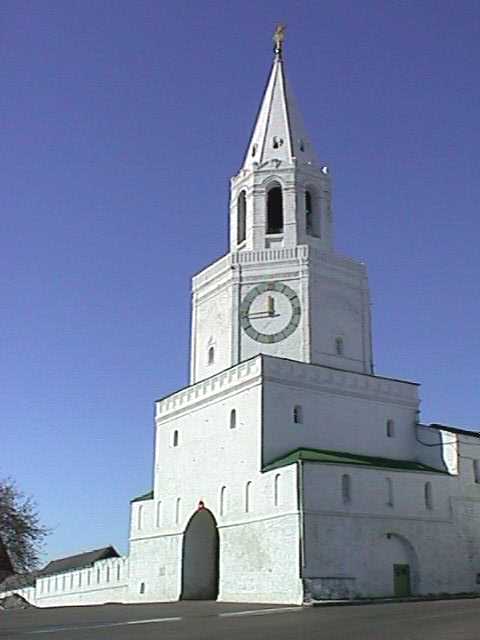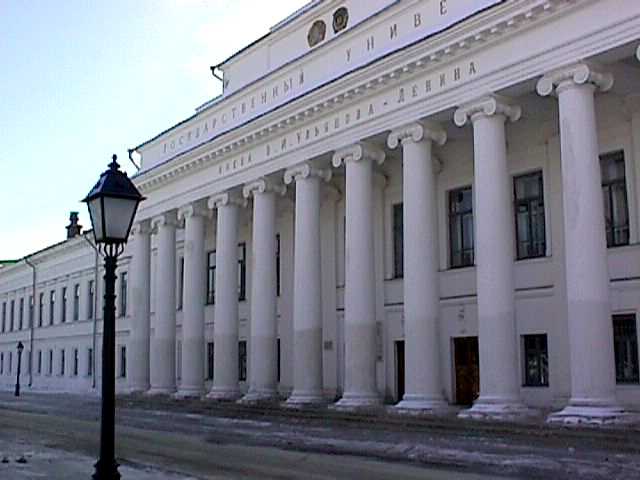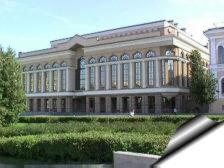Kazan
 Kazan, one of the biggest and most important cultural and industrial centres on the Volga River, with a population nearing 1.2 million made up of 77 different ethnic groups, is the capital of the Republic of Tatarstan, which in 1994 was the first of the former republic of the Russian Federation to sign a bilateral treaty with Russia, thus showing the way to create a new Federatoin on the basis of mutual agreement and voluntary partnership.
Kazan, one of the biggest and most important cultural and industrial centres on the Volga River, with a population nearing 1.2 million made up of 77 different ethnic groups, is the capital of the Republic of Tatarstan, which in 1994 was the first of the former republic of the Russian Federation to sign a bilateral treaty with Russia, thus showing the way to create a new Federatoin on the basis of mutual agreement and voluntary partnership.
In the XIII century Volga Bulgaria suffered from the mongol Batu-Khan aggression. In 1236 Bulgaria was conquered and annexed to Golden Horde. Golden Horde was the largest medieval state of Eurasia, the heart of rich civilization, represented by classic symbiosis of prior nomadic and new city cultures. The true masterpieces of medieval Tatar literature were created here.
After the final downfall of Golden Horde in the third-fourth decades of the XV century in its vast area were formed separate Tatar states. They include Kazan Khanate (1445) situated in the northern boundaries of Volga Bulgaria from the river Sura in the west to the river Belaya in the east. Kazan became the capital of Kazan Khanate. The XV century and the first half of the XVI century was the period of prosperity of Kazan Khanate and its capital.
The main population of Kazan Khanate consisted of descendants of bulgars and new-comers kipchako-tatars. Their culture, religion and written language were adopted from Volga Bulgaria and Golden Horde. In the period of Kazan Khanate and other Khanates (Crimean, Kasimov's, Siberian and Astrakhan) the formation of the Tatar Nationality was finished.
 As a result of armed conflicts, fires and rebuilding, among architectural constructions of Kazan Khanate Epoch only Suyumbika Tower (Khan's Mosque) and Nuraliev Mosque reserved on Kremlin territory. As a result of armed conflicts, fires and rebuilding, among architectural constructions of Kazan Khanate Epoch only Suyumbika Tower (Khan's Mosque) and Nuraliev Mosque reserved on Kremlin territory.
According some of Tatar legends, Suyumbika Tower was erected at the tomb of Kazan Khan Safa-Girey by his wife - Queen Suyumbika. Today it is one of the "falling" towers (deviation from axis is 194 cm).
Kazan, which like Rome stands on seven hills, is the capital of the ancient people and country whose names, though familiar, are shrouded in misconceptions. The people are the Kazan Tatars; the country is Tatarstan. Situated, as a result of historical circumstances, in the very heart of Russia, only eight hundred kilometres to the east of Moscow, Kazan is the capital of a multi-national republic that occupies the area between the Volga and the Ural Mountains. The Tatars have their own language, their own culture, their own age-old traditions and festivals, their own faith, but their past has been and remains intertwined with the history of Russia in the most dramatic and sometimes fateful way.
Under its spell Kazan was transformed from a small frontier Bolgar town into a powerful citadel of the khans and a world-famous trading capital on the Volga; its spell overthrew Kazan, turning it into a captive without rights; its spell made it rise again, but in the form a capital of a huge province... With another sharp turn of history. Kazan became in 1922 the capital of an autonomous Soviet republic and traversed the whole thorny path of the Soviet era. Now Kazan has a new status - capital of Tatarstan republic.
 In Kazan today a great deal of attention is given to the revival of research in the humanities, much of which was forgotten during Soviet period. With a population of 1.2 million, Kazan has a total of 15 higher educational institutions with 125 000 students. In Kazan today a great deal of attention is given to the revival of research in the humanities, much of which was forgotten during Soviet period. With a population of 1.2 million, Kazan has a total of 15 higher educational institutions with 125 000 students.
In the nineteenth century, Alexander Herzen wrote : "Kazan is somehow the main focus of the neighbouring provinces to the south and east: they receive thier education, customs and fashions from it. The significance of the Kazan is very great: it is place were two worlds meet. It has two origins, the West and the East, and you can see them at every cross-roads; here they lived together in amity as a result of continuous interaction, and began to create something quite original".
Kazan is inseparably linked not only with Alexander Pushkin, Yevgeny Baratynsky, Lev Tolstoy, Nikolai Lobachevsky, Maxim Gorky and Fyodor Chaliapin, who was born in Kazan, but also with outstanding representatives of Tatare culture, such as Kayum Nasyri, Shigabetdin Mardzhani, Gabdulla Tukai, Fatikh Amirkhan and Gayaz Iskhaki.
The capital of Tatarstan becomes day after day brighter and more beautiful.
CITIES OF RUSSIA
Abakan I
Aginskoye I
Anadyr I
Arkhangelsk I
Astrakhan I
Barnaul I
Belgorod I
Birobidzhan I
Blagoveshensk I
Bryansk I
Cheboksary I
Chelyabinsk I
Cherkessk I
Chita I
Ekaterinburg I
Elista I
Gorno-Altaisk I
Groznyi I
Ioshkar-Ola I
Irkutsk I
Ivanovo I
Izhevsk I
Kaliningrad I
Kaluga I
Kazan I
Kemerovo I
Khabarovsk I
Khanty-Mansiysk I
Kirov I
Kostroma I
Krasnodar I
Krasnoyarsk I
Kudymkar I
Kurgan I
Kursk I
Kyzyl I
Lipetsk I
Magadan I
Maikop I
Makhachkala I
Moscow I
Murmansk I
Nalchik I
Naryan-Mar I
Nizhny Novgorod I
Norilsk I
Novgorod the Great I
Novosibirsk I
Omsk I
Orenburg I
Oryol I
Penza I
Perm I
Petropavlovsk-Kamchatsky I
Petrozavodsk I
Pskov I
Rostov the Great I
Ryazan I
Saint-Petersburg I
Salekhard I
Samara I
Saransk I
Saratov I
Smolensk I
Stavropol I
Syktyvkar I
Tambov I
Tomsk I
Tula I
Tver I
Tyumen I
Ufa I
Ulan-Ude I
Ulyanovsk I
Vladikavkaz I
Vladimir I
Vladivostok I
Volgograd I
Vologda I
Voronezh I
Yakutsk I
Yaroslavl I
Yuzhno-Sakhalinsk I
|